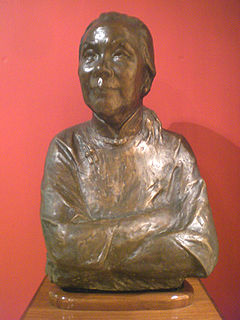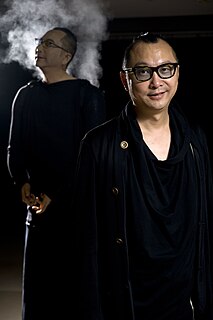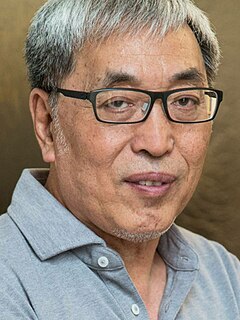
798 Art Zone, or Dashanzi Art District, is a complex of 50-year-old decommissioned military factory buildings boasting a unique architectural style that houses a thriving artistic community in Dashanzi, Chaoyang District of Beijing. The area is often called the 798 Art District or Factory 798 although technically, Factory #798 is only one of several structures inside the complex formerly known as 718 Joint Factory. The buildings are within alleys number 2 and 4 on Jiǔxiānqiáo Lù (酒仙桥路), south of the Dàshānziqiáo flyover (大山子桥). The area is anchored by the UCCA Center for Contemporary Art, the largest and most visited venue in the area. In recent years, it has been the main venue for the annual Beijing Queer Film Festival and Beijing Design Week.

Sui Jianguo, professor and ex-chairman of the Department of Sculpture in Central Academy of Fine Arts in Beijing, is a contemporary Chinese artist.
Fuck Off was a contemporary art exhibition which ran alongside the Third Shanghai Biennale (2000) in Shanghai, China. The exhibition's title translates as "Uncooperative Attitude" in Chinese, but the blunter English language sentiment was deemed preferable. The exhibition encompassed conceptual, performance, and protest art.
Yang Zhichao is a multi-disciplinary artist who is known for his agonizingly painful performance pieces.
Feng Boyi is an independent art curator and critic in China. His work focusses primarily on contemporary Chinese art, working with museums and displaying art collections. He has worked several times with artist Ai Weiwei, publishing his journals illegally or working with him in exhibitions and has organized many controversial art exhibitions in China. He has been assistant editor of the China Artists' Association newsletter Artist's Communication since 1988. He has also edited and published numerous catalogues and papers on art and established the Artists' Alliance, a major online forum for contemporary art in China. Feng Boyi has been known to be an instigator to the up-and-coming contemporary art movement in Beijing, starting with publishing articles and journals from artists Ai Weiwei and Xu Bing.

ArtAsiaPacific is the longest running English-language periodical solely dedicated to covering contemporary art and culture from sixty-seven countries, territories, and Chinese Special Administrative Regions that it considers to be within Asia, the Pacific, and the Middle East. It is published six times a year and is distributed internationally. A regular issue includes feature-length articles on artists, themes or events; essays; profiles on artists or collectors; reviews of biennials, exhibitions, art publications and films; news including obituaries and appointments; auction and art fair reports; and previews of shows.
Caochangdi was an urban village and renowned arts district located in the Chaoyang District of northeast Beijing at the intersection of the 5th Ring Road and Airport Expressway. Translated as "grasslands" in Mandarin, Caochangdi was home to a diverse group of residents, including migrant workers, farmers, students and artists, most notably, Ai Weiwei. Caochangdi developed into a thriving arts and cultural hub when artists began to move into the area around 2000, attracting international attention similar to the nearby 798 Art Zone. Demolition of the village began in July 2018.

Zuoxiao Zuzhou, real name Wu Hongjin, (吴红巾), is a Chinese musician and artist.

Asia Art Archive (AAA) is a nonprofit organisation based in Hong Kong which focuses on documenting the recent history of contemporary art in Asia within an international context. AAA incorporates material that members of local art communities find relevant to the field, and provides educational and public programming. In 2016, AAA is one of the most comprehensive publicly accessible collections of research materials in the field, and has initiated about 150 public, educational, and residential programmes.
Chambers Fine Art is an art gallery based in New York City and Beijing that specializes in Chinese contemporary art. Opened in New York in 2000 by Christophe Mao. Notable Chinese artists who had their first solo show in the United States at Chambers include: Lu Shengzhong, Shi Jinsong, Hong Hao, Qiu Zhijie, Hong Lei, and Chi Peng.

Fang Zhaoling, also known as Lydia Fong, was a Chinese painter and calligrapher.
Huang Rui is a Chinese artist known for his social and cultural criticism.

UCCA Center for Contemporary Art or UCCA is a leading Chinese independent institution of contemporary art. Founded in 2007. Located at the heart of the 798 Art District in, China, it welcomes more than one million visitors a year. Originally known as the Ullens Center for Contemporary Art, UCCA underwent a major restructuring in 2017 and now operates as the UCCA Group, comprising two distinct entities: UCCA Foundation, a registered non-profit that organizes exhibitions and research, stages public programs, and undertakes community outreach; and UCCA Enterprises, a family of art-driven retail and educational ventures. In 2018, UCCA opened an additional museum, UCCA Dune, in Beidaihe, a seaside resort town close to Beijing. The museum had 385,295 visitors in 2020, and ranked 55th in the List of most-visited art museums in the world.

Shen Jingdong is a contemporary Chinese artist noted for his paintings and sculpture of Chinese iconography. He lives in Beijing.

Yuan Gong, is a Chinese contemporary artist. He has obtained a PhD degree in theory of art at the Chinese National Academy of Arts in 2012, but has immersed himself in different aspects of Chinese contemporary art since the 1990s. Being both creator and researcher, designer and planner, Yuan is a multiple facets artist playing at the interface of conceptual art, performance and fine arts. Using a large variety of media, his artworks address many philosophical questions, reflecting his concerns about the Chinese society and impugning the art system, the exhibition format and the status of the artwork.

M+ is a museum of visual culture in the West Kowloon Cultural District of Hong Kong. It exhibits twentieth and twenty-first century visual culture encompassing visual art, design and architecture, and moving image. It opened on 12 November 2021.
Zhao Yao is an artist in installations as well as performance, video and photography. He grew up in Sichuan and currently lives and works in Beijing.

Mao Lizi is the pseudonym of Zhang Zhunli (张准立), a Chinese artist born in Shanghai. He was one of the founding members of China's pioneer contemporary art groups known as the Stars, of which Ai Weiwei and Wang Keping were also members.
Stella Zhang is a Chinese contemporary artist whose practice ranges from painting to sculpture and installation. Zhang is notable for her strong feminist approach in art-making. Her work is described as "a statement for women’s power and identity," Zhang is exhibited world-wide and collected by public institutions such as the National Art Museum of China, Beijing, China, Copelouzos Family Art Museum, Athens, Greece; and Tan Shin Fine Arts Museum, Tokyo, Japan. There are seven monographs focusing on her work, published by Chinese Culture Foundation of San Francisco, Si Chuan Art Press, EDGE Gallery, JKD Gallery, and Galerie du Monde. She is a guest lecturer at Stanford University and also teaches at the Central Academy of Fine Arts in Beijing.

Michael Xufu Huang is a Chinese art collector and socialite. Huang co-founded the M Woods Museum of Beijing's 798 Art Zone in 2015 and the X Museum in the Chaoyang district of Beijing in 2020. His art collecting activities have led The New York Times to profile him in 2017 as "something of a next-generation Jeffrey Deitch of China."











